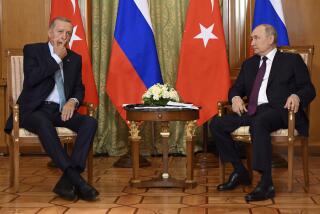Soviets Facing Winter Famine, Official Warns
- Share via
MOSCOW — The Soviet Union once again faces the threat of a hungry winter, a top government official warned Sunday as he explained new emergency measures that President Mikhail S. Gorbachev decreed this weekend in an attempt to keep his 290 million citizens fed.
“The situation is such that the country is facing a real threat of famine, and this is no time for empty verbiage,” First Deputy Prime Minister Vladimir I. Shcherbakov said in an evening television interview. “Everything must be done to bring the harvest in.”
Gorbachev, his Cabinet and republic leaders spent 4 1/2 hours Saturday discussing the worsening crisis in food and consumer goods. The Soviet president issued a “very serious and very strong” decree to stimulate production, Shcherbakov said.
With the political spotlight focusing on last week’s Moscow summit with President Bush and on Gorbachev’s efforts to forge a new Soviet federation, this nation’s desperate economic problems have tended to recede somewhat into the background, but the situation continues to deteriorate.
Soviet national production in the first half of this year fell at the disastrous rate of about 11%, inflation is skyrocketing, the government’s budget deficit has ballooned and the country is deeper in debt to foreign creditors.
This year’s grain harvest is expected to total about 195 million tons compared with last year’s bumper 235 million tons, meaning that the Soviet Union will once again have to import millions of tons at a time when export revenue from oil has plummeted.
Gorbachev’s decree includes plans to orient the country’s foreign-currency spending toward imports of medicine, foodstuffs and the materials needed to produce consumer items. It also encourages enterprises and republics to barter their output for the consumer goods they need.
It was Gorbachev’s first major economic move since attempting to persuade the Group of Seven summit in London last month that he is committed to true reform.
In an “absolutely extraordinary decision,” Shcherbakov said, Gorbachev also ordered that half of all imported goods be traded to farmers in exchange for their produce.
The Soviet government tried similar measures last year to persuade farmers to produce more and sell their hoarded stocks of grain to the state. But the offers were often ill-timed, and the farmers were skeptical--often with good cause--that they would ever receive the cars, tractors and other goods they had been promised.
Last year, concerns about Soviet hunger brought a flood of food aid from the West in carefully wrapped packets from Germany and the United States and wholesale gifts even from Turkey and India.
The outlook for this year is at least as grim as the old centralized system of supply continues to fall apart and independent businesses slowly find their niches.
But Shcherbakov, who oversees the government’s economic projections, held out a shred of hope. He said the economy somewhat stabilized in June and July, and he promised that the signs of a gradual turnaround could be expected by October.
He assured Soviet viewers that supplies of gas, coal and oil will be “normalized by the end of the year,” although he avoided the question of when there will be enough food and clothing in the shops.
Gorbachev’s decree was aimed largely at one of the key problems of Soviet light industry: obtaining raw materials.
Shcherbakov said that if, for example, “there’s a choice on whether to allot metal to produce refrigerators and washing machines or to give it over to some kind of industrial production, the metal should definitely be given to the refrigerators.”
The government also plans to cut import-export taxes and the exorbitant duties that customs authorities recently imposed on consumer goods entering the country, including “suspicious” quantities of new clothing carried in the luggage of returning Soviet travelers.
Shcherbakov said that customs authorities had taken the extremely unpopular decision to raise duties on their own and that the government disagreed with them.
More to Read
Sign up for Essential California
The most important California stories and recommendations in your inbox every morning.
You may occasionally receive promotional content from the Los Angeles Times.












